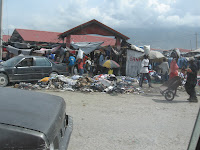People keep asking me how my trip to

Earlier this month I went with seven other volunteers to
We didn’t have a lot of details before we left, but our team was comprised of 3 leaders from the construction industry, a woodworker with electrical experience, and four of us with various contributory skills like the ability to speak French, to work well with children, to lead teams, and experience working in developing countries.
We went with our church, whose pastor has known the head of the NGO for 30 years, and so we were readily plugged in to, not just a local NGO network, but also a network of churches and pastors on the ground.
We started each day with devotions. Much like the daily assemblies of my high school days, there was a reading, discussion, and if energy was lagging, maybe some singing. None of us knew each other before the trip. We slept doubled up and in bunks, ate meals together, sweated in the sun together, talked about spouses back home.
There were some Lord of the Flies moments. Some struggling to determine who the alphas were, who would follow, who could be trusted as a lone wolf. There were days when sexual tension kinda wrecked the flow. There were breakthrough moments when people were brought to tears. There were angry moments when we lashed out about how much more work there was to be done.
In short, we were a microcosm of the relief effort as a whole.
To put the damage into perspective, community leader Rachel Decoste reminded me that it took two years to clear the debris from the twin towers in Manhattan.
"And that's just two buildings - in the richest country in the world, using the most sophisticated equipment. We are almost ten years on from September 11th and they still haven't rebuilt."
The reconstruction in
But our biggest successes came in connecting to individual people.
There was the young adult we befriended who relied on that trust to reveal a health problem. We raised money to pay for surgery that got scheduled the same week. There were kids we met that we could help with homework or tell about how opportunities for education had opened doors for our parents or ourselves. There were congregants on Sunday who came forward asking for prayer. There was the relief worker we connected with and helped re-buoy after burnout.
As a black ‘Caribbean-Canadian’ who speaks French travelling with a group of mainly white anglophones, I sometimes felt I was on a different trip than everyone else. Of course as a policy wonk as opposed to construction expert, I could expect no less.
Such contradictions have followed me on visits to developing countries and in work with development organisations before. The gaps between advocacy at the systemic level and relief work on the ground never stop being frustrating.

But there is a restorative power that can’t be denied in building bridges - person to person, smile to smile.
* post updated Nov 26 with news clip above
